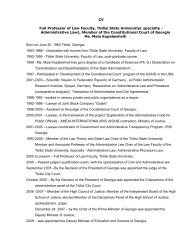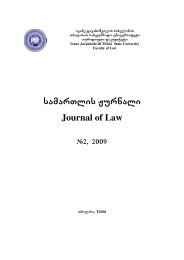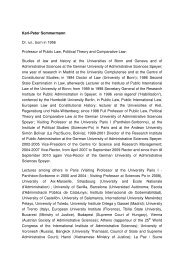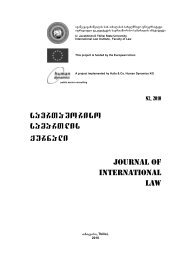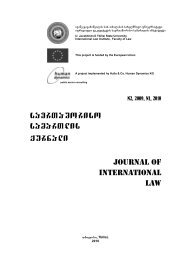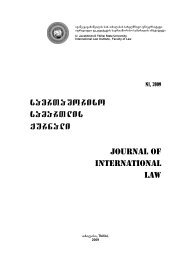Untitled
Untitled
Untitled
Create successful ePaper yourself
Turn your PDF publications into a flip-book with our unique Google optimized e-Paper software.
E. SIRADZE, JURISDICTION OF THE COASTAL STATE OVER THE SHIP OF FOREIGN STATE...<br />
commercial purposes enjoy full immunity from<br />
the jurisdiction of the coastal State. 7 This practice<br />
is not an innovation and reflects well established<br />
norm of the customary law.<br />
Codification of this issue first was initiated<br />
by the Brussels Convention “for the Unification<br />
of Certain Rules Concerning the Immunity<br />
of State-owned Ships” of April 10, 1926.<br />
However, long before in 1873, In Charkiech<br />
case the court established that, irrespective<br />
the fact whether the ship was owned by sovereign<br />
of semi sovereign State of Egypt and<br />
was sailing under the flag of Ottoman Navy,<br />
its detention was not in conflict with the norms<br />
of international law, because in that particular<br />
case the ship was used for commercial shipment.<br />
Namely, in resolution was noted that, if<br />
a sovereign assumes the character of a trade,<br />
and sends a vessel belonging to him to this<br />
country to trade here, he must be considered<br />
to have waived any privilege which might otherwise<br />
attach to the vessel as the property of<br />
the sovereign... 8<br />
Although, the fact that warships and government<br />
ships operated for non-commercial<br />
purposes enjoy immunity from the jurisdiction<br />
of the coastal State, it does not release them<br />
from the obligation to respect and observe the<br />
laws of the coastal State. Otherwise the coastal<br />
State is entitled to require violating ship to leave<br />
internal waters and the territorial sea. Therefore,<br />
the flag State shall bear responsibility for<br />
any caused damage. 9<br />
As regards to merchant marine, in internal<br />
waters the coastal State in relation to them<br />
may control the following: navigation, overflight,<br />
fishing, scientific research, laying of submarine<br />
cables, processing of seabed, protection<br />
of environment.<br />
The majority of these issues are regulated<br />
by the Convention, though only with respect<br />
to the territorial sea and the regime of the internal<br />
waters remained open. Perhaps this is<br />
reasoned also by the fact that, the jurisdiction<br />
of the coastal State is completely extended,<br />
except few exceptions, when the coastal State<br />
limits its sovereignty in favor of the other State<br />
under bilateral agreement. Consequently, the<br />
coastal State in its internal waters may control<br />
the ship of foreign State likewise it would occur<br />
at its land territory. 10<br />
As it is recognized that the internal waters<br />
with their status are equalized to the land territory<br />
of a State, it is obvious that determination<br />
of its status may unlikely be the subject of<br />
any international Convention.<br />
It is general norm that foreign ships do not<br />
have a right of navigation in internal waters.<br />
The issue of entry into the port is more disputable.<br />
In accordance with the customary law<br />
there is no norm which bounds the States to<br />
allow necessary entry to the ships of foreign<br />
States into their ports. 11 On the other hand in<br />
Arbitrary decision of Aramco of 1958 is noted<br />
that following to international law ports of each<br />
country must be open for the ships of other<br />
States and they may be closed only when it is<br />
required by vital interests of the State of port. 12<br />
But in Nicaragua case the same court established<br />
that the State of a port taking into consideration<br />
its sovereignty may regulate accessibility<br />
to the ports. 13 Although, the international<br />
ports of the States is considered to be open<br />
for international navigation of the ships (certainly<br />
this does not refer to military ships), this<br />
rule has not obtained the status of customary<br />
law norm. Each State determines the rule of<br />
entry of the ships into the ports itself independently<br />
or on the basis of bilateral international<br />
agreements. 14<br />
First of all States are entitled to determine<br />
which ship may be granted with the right to<br />
enter into the port and secondly, the State may<br />
close a port for international navigation for<br />
security purposes. In this case it is difficult to<br />
prove whether this is crucial interest of the State<br />
or not.<br />
As stated above, the internal waters are<br />
the part of the territory of a State and consequently<br />
jurisdiction of a coastal State extends<br />
over the ships and their crew entered into the<br />
ports. However, the jurisdiction of a flag State 15<br />
always extends over the ship, which causes<br />
certain collision of norms (or conflict of jurisdictions).<br />
There are two different approaches<br />
with respect to this issue: French and Anglo-<br />
American.<br />
French approach was established in relation<br />
to two American ships “Sally” and<br />
“Newton”, where the fight between the crew<br />
members took place. French court established<br />
that, in case of commitment of crime<br />
in a port on the board of a ship, if it only<br />
violates internal regulations of a ship and<br />
refers to the ship and a crew, local authorities<br />
shall not interfere, unless it has direct<br />
affect on the good order and security of the<br />
port and if request on assistance is received<br />
93





